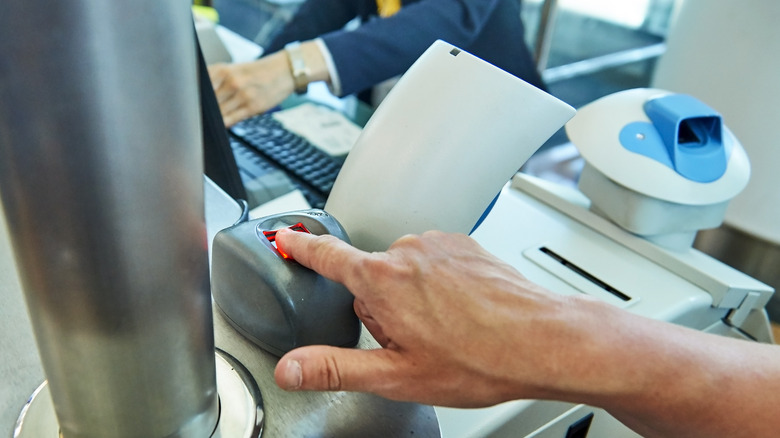Fingerprint Scanning Is About To Become The New Normal When Visiting Europe
Tickets to Europe, travel insurance, reservations to the Louvre — check. Luggage, carry-on, passport — check. Fingerprints...? As technology continues to redefine our world, traditional customs of international travel are undergoing significant shifts. The latest development catching the attention of globetrotters is the move towards biometric verification in Europe. If you're planning a European sojourn anytime soon, prepare for fingerprint scanning to become a part of your entry process.
The new system known as the European Union Entry/Exit System, or EES for short, is coming, potentially as early as 2024. Be ready to have your photograph taken, fingerprints scanned, and passports validated at self-service kiosks across all EU borders. The automated system will record names, travel documents, biometric data, and details of entry and exit. If anyone refuses to provide their biometric data, they will be denied entry into any European destination that uses the EES system.
The EES will apply to all non-EU nationals. Before you embark on your travels, make sure to research and prepare the appropriate visa. Depending on your nationality, you may not need a visa at all to stay for a maximum of 90 days within any 180-day period. Regardless of whether you need a visa or not, EES will apply.
The security and efficiency of biometrics
Several countries, such as Australia, Malta, and Costa Rica, have already implemented biometric checks. Europe's move towards this system signifies a unified approach to bolstering security — the primary motive behind fingerprint scanning. With the current geopolitical situation, rise in terrorism, and concerns about identity theft, European nations are gearing up to make their borders as secure as possible. Biometric verification provides a fast and secure method of confirming a traveler's identity. Unlike passports or other documents, fingerprints are unique and nearly impossible to forge or alter.
Beyond the undeniable security advantages, the introduction of biometric checks will save lots of time for the half-billion visitors coming annually to the EU. As border crossings keep growing, Schengen member states won't have to increase the number of border guards required to do the job. Automated kiosks equipped with fingerprint and facial recognition technology can process travelers much faster than traditional methods. This means reduced waiting times at immigration counters and a more streamlined entry process.
Furthermore, the data collected will be stored in a central system, allowing for swift information sharing across member states. This is expected to aid in monitoring visa overstays, tracking persons of interest, and facilitating lawful investigations. For travelers with a criminal history, the EU is generally tolerant. Entry will likely be allowed if it is a minor criminal charge. However, there are strict policies for those with serious convictions.
Balancing security and privacy at the border
As with anything that involves collecting and storing personal data, there are concerns related to privacy and potential misuse. In its commitment to safeguarding individual rights, the EU has emphasized that EES data will be stored in compliance with the General Data Protection Regulation (GDPR) standards. Only select groups will have access — Europol and law enforcement authorities for the purposes of criminal intelligence and identification, and border guards and consular officers for security and visa compliance. Strict controls will prevent any unauthorized access and ensure that the data is used solely for the purposes it was collected.
For travelers to the EU, while packing bags and planning itineraries, it's also essential to stay updated on changing border protocols. As fingerprint scanning becomes normalized, travelers can expect a quicker, albeit different, travel experience. Ensure your passport is valid, your European visa is appropriate, and your border behavior is respectful — all of the above will help you get through airport security faster and without any issues.
Europe's embrace of biometric technology underscores the continent's commitment to ensuring the safety of its residents and visitors. While it's a change in the travel ritual many have grown accustomed to, it's a step forward in aligning with the security needs of today. As always, the balance between security and individual privacy remains a delicate one, but with transparent protocols, Europe aims to make this transition as seamless as possible.


